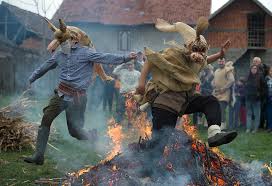Carnival in Greece
In Greece we have similar customs to Serbia. Some of our customs date back to the Dionyssian feasts of ancient Greece or even earlier. They take place during the Carnival time and most of them are meant to sent away bad spirits or evil creatures which cause damages to the crops and to people's properties. They last until the first Sunday of Orthodoxy when fasting begins. Here are some of the costumes they wear in differernt parts of Greece. They belong to our cultural heritage which seems to be shared in many Balkan countries (which means they are not only our customs), probably due to the long time people have lived side by side, for centuries, exchanging ideas and beliefs, before the birth of nations in the 19th century.
 |
| Koudounades |
 |
| Genitsari |
 |
| Genitsari and Boules |
 |
| Koudounades |
 |
Momogeri
Clean Monday in Greece - Καθαρά Δευτέρα |
Last Monday ( Monday 11th, 2019) for Greece it was
Clean Monday. For Greece
and Cyprus (Christian Greek Orthodox Church) it signifies the end of the
Carnival and the beginning of lent before Easter. It is the 7th Monday
before Easter Day and during that day people use ot go to the country
side, eat fasting food like halva, squids, octopus, olives, tarama,
dolmadakia, beans and lagana ( a kind of bread without yeast). During
that day people also fly kites, as a welcome to spring.

















